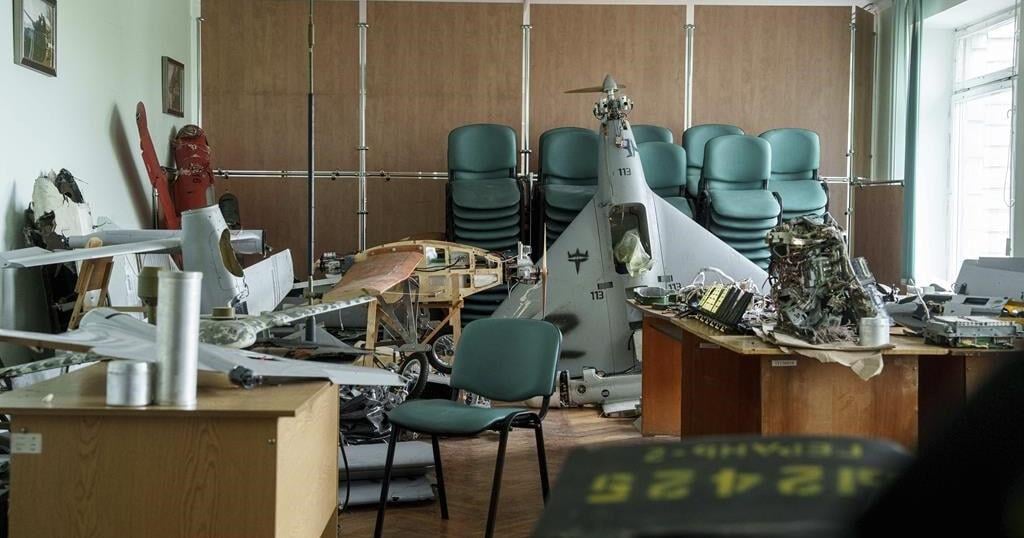BUDAPEST, Hungary (AP) — Pope Francis plans to outline his vision for the future of Europe during a three-day visit to Hungary starting Friday, with Russia’s war in Ukraine, migration flows and Hungary’s tense relations with Brussels looming large over the pontiff’s weekend journey.
Hungarian officials say Francis’ pilgrimage was designed primarily to let the pope minister to the country’s Catholic community and to encourage its members in their faith. But with the war unfolding next door and Hungary butting heads with other European Union nations over rule of law issues and LGBTQ+ rights, Francis’ words and deeds in the heart of Europe will carry strong political undertones.
After landing at Budapest’s Liszt Ferenc airport, Francis was scheduled to meet with President Katalin Novak and Prime Minister Viktor Orban, and then to deliver his main political speech to Hungarian authorities and diplomats. He has a chance to speak to Hungarian society and Europe at large in his final event Sunday, when he’ll address academic and cultural figures at Budapest’s Catholic University.
In between, Francis is set to meet with some of the 35,000 Ukrainian refugees who have remained in Hungary after 2.5 million fled across Ukraine’s border with Hungary’s early on in Russia’s invasion. It will be another opportunity for Francis to raise immigration as a topic and and to reiterate his belief that European countries should, within their means, open their arms and borders to people fleeing poverty as well as conflicts.
Orban’s hard line on migration is well known. In 2015-2016, Hungary built a razor wire fence on its border with Serbia to stop people from entering. However, Francis has expressed appreciation for Hungary’s recent welcome of Ukrainian refugees.
Vatican spokesman Matteo Bruni said Francis would use his time in the heart of Europe to look to the continent’s future.
“It’s difficult to not think about the European Union and all of Europe,” Bruni said of the trip. He noted that the “passion” for Europe had perhaps faded over the years and that Francis aimed to revive “the Europe of peoples, with its own history and responsibility in the commitment to global peace.”
For the 86-year-old pontiff, the visit will once again test his frail health after he spent four days in the hospital last month with bronchitis. While Hungarian officials had hoped Francis would travel around the country, the Vatican opted to keep him in Budapest, where he spent seven hours in 2021 to close out a church congress.
The visit comes as the European Union’s parliament continues to put pressure on Hungary to counter what EU lawmakers consider a deterioration in the rule of law and democratic principles under Orban’s government, including rolling back the rights of LGBTQ+ people.
The four biggest groups in the European Parliament have called on the EU’s executive commission to withhold pandemic recovery funds for Hungary until liberal democracy principles are met.
The European Commission has accused Orban for years of dismantling democratic institutions, taking control of the media and infringing on minority rights, allegations the prime minister has denied.
Hungary’s Constitution, approved unilaterally by Orban’s right-wing populist Fidesz party in 2011, outlaws same-sex marriage, and the government has prohibited same-sex couples from adopting children. The government has also outlawed the depiction of homosexuality or divergent gender identities to minors in media content.
Catholic doctrine also prohibits same-sex marriages, but Francis has backed legal protections for people in same-sex unions. He has long ministered to gay and transgender Catholics, while blasting “gender ideology” as an alleged form of the West’s ideological colonization of the developing world.
Francis is unlikely to wade directly into Hungary’s democracy and LGBTQ+ rights debate and instead speak in general terms about the lofty, democratic goals that decades ago inspired the forming of what would become the European Union.
Hungary’s ambassador to the Holy See, Eduard Habsburg, said he thinks Hungary is actually upholding Europe’s founding ideals better than many of its EU partners.
“Hungary has stayed true to the values that have always been the values of the European Union, which is family, faith, Christian, Judeo-Christian roots, sovereignty and all these things,” Habsburg said. “And you sometimes have the idea that … some of these have been lost in the western parts of Europe.”
With Francis traveling closer to Ukraine than at any time since Russia invaded Ukraine, the war will also be front and center during his visit. He plans to visit a Greek Catholic church that delivered aid to Ukrainian refugees.
Francis, who met with Ukraine’s prime minister on the eve of the trip at the Vatican, is likely to repeat his call for a peaceful resolution of the war and to express solidarity with the Ukrainian people.
Orban has called for a cease-fire but been lukewarm in his support of Ukraine, refusing to supply Kyiv with weapons and threatening to veto EU sanctions against Moscow while maintaining Hungary’s strong dependence on Russian energy.
While there was speculation that Francis might meet with Russian Orthodox Patriarch Kirill while in Budapest, no such meeting is planned, according to the Rev. Csaba Torok, the parochial administrator for the Cathedral of Esztergom and coordinator of Catholic programming on state media.
Francis held an unprecedented meeting with Kirill in 2016 and had hoped to pursue a second encounter, but Kirill’s support for Russia’s invasion put the plans on indefinite hold. ___
Associated Press religion coverage receives support through the AP’s collaboration with The Conversation US, with funding from Lilly Endowment Inc. The AP is solely responsible for this content.
___
Follow AP’s coverage of the war in Ukraine: https://apnews.com/hub/russia-ukraine
Related


































